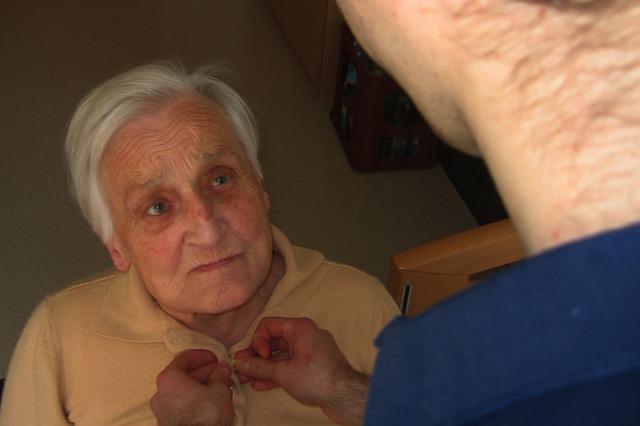On an episode of This American Life there was a story about a new way to help people with Alzheimer’s and their caregivers.
It used to be that caregivers were advised to try to help the patient stay with themselves, to stay in their lives, identities and relationships as they actually happened. Post photos and reminders about people and dates and important events and places.
When the patient confuses the daughter for the sister or rises in the middle of the night convinced that it’s time to catch the bus to work, tell them, “No, no, this is your daughter; no, no, look, it’s the middle of the night, go back to bed.”
In response to these efforts, the patient often would become more confused or even enraged. Once-loving parents would spout hate at adult children who were giving their all just to ensure that they were safe and well cared for.
This new approach is based on a fundamental rule of improvisational theater. When you get up onstage with a fellow improvisor, you never say, “No” or argue with anything they assert in terms of the theatrical reality being created.
You always say, “Yes, and…”
“Yes, we’re in a subway station wearing clown suits, and your red nose is bigger than mine, and that’s no fair.”
“Yes, we’re Pegasus unicorn princesses flying over the Netherlands, and we’re delivering a very important message to the guy who runs this cafe right here.”
Clearly, this creates lots more dramatic possibility than if the second person refutes the first person’s asserted reality.
Taking this approach with the Alzheimer’s patient would mean talking to her as though you were, indeed, her sister, if that’s who she thinks you are right now. It would mean talking with her about the bus ride she’s planning to take. What’s happening at the job lately? Who will she be having lunch with today? It’s about taking a much looser approach to what’s real and what isn’t. It’s about entering the Alzheimer’s patient’s world, playing within it, and finding creative ways to get her back to bed or to become yourself again (not her sister) in her eyes, in the context of her world and her perceptions.
What a sacrifice, to surrender your own belief about what’s real to enter the playground of the sick person’s reality. What a beautiful gift.
And ultimately, based on reports of people who try this, it’s easier. It makes the burden of the disease lighter. It can even make living with an Alzheimer’s patient fun. The patient can have fun too. What a different thing than agonizing over one’s forgetfulness, over the loss of the identity carefully cultivated and clung to for a lifetime.
(Full disclosure: I have never been an Alzhemier’s caregiver, and I don’t even begin to suggest that I understand the challenges people face when in this position.)
I see any reason to adopt a “Yes, and…” attitude in relationships and in life in general to be a great gift—an invitation to settle into the essence of who we are, which is not only our memories, our particular relationships, or our ability to remember where we put something or what we came upstairs to get.
Who is the Alzheimer’s patient who has forgotten who she is? She’s still right here. She can see everything around her. She can see, taste, touch, smell. She can breathe one breath, then the next.
If those around her are able to hold that space—to let her shed who she has been to become luminously present, instead of participating in a panicked attempt to keep her in her old life—can she experience more peace in this transition?
I hope so. I know my own grandmother, who had severe dementia in her later years, was more serene then than she had ever been before. In her old life, she’d been anxious and fidgety, afraid and worried. Not in those later years. She’d sit and watch her grandchildren play with a peaceful smile on her face.
The workaday world requires us to hold on to so much. It seems to demand that we establish our beliefs and then argue for them. But what if we were to say “Yes, and…” to everything?
A friend told me of a battle she’s in with her teenaged son, who has decided that religion is bullshit, that the God most imagine is a cruel and whimsical tyrant, and that anyone who believes in God must not be very intelligent. She wants to argue with him that some religious beliefs and traditions are really worthwhile. She wants to argue in favor of the possibility that God is real.
But what if she said, “Yes, and…” to his rants instead?
“Yes, the God in the Old Testament really liked to smite people for questioning His word. And the God in other traditions is different… much less like a cranky dictator!”
What if, when someone else disagreed with us or said something with which we disagreed, we reached out, found a point of connection with the other person’s world, and built from there?
We could skip that pointless exercise known as the argument—something that usually devolves to some form of the childhood “Yuh-huh!” “Nuh-uh!” back-and-forth, where positions are held and belief trumps connection.
“Yes, and…” makes for great improv theater, but maybe it could also transform human relationships. This is empathy in action. Art as life.
Yes.
Relephant reads:
You Cannot Win an Argument on Social Media (But You Can Have the Last Word).
The Stress Response: Fight, Flight, Freeze, Feed & Fornicate.
Relephant bonus: Another (Buddhist) tip on how to make relationships last:
Love elephant and want to go steady?
Sign up for our (curated) daily and weekly newsletters!
Editor: Travis May
Photo: Pixabay












Read 19 comments and reply